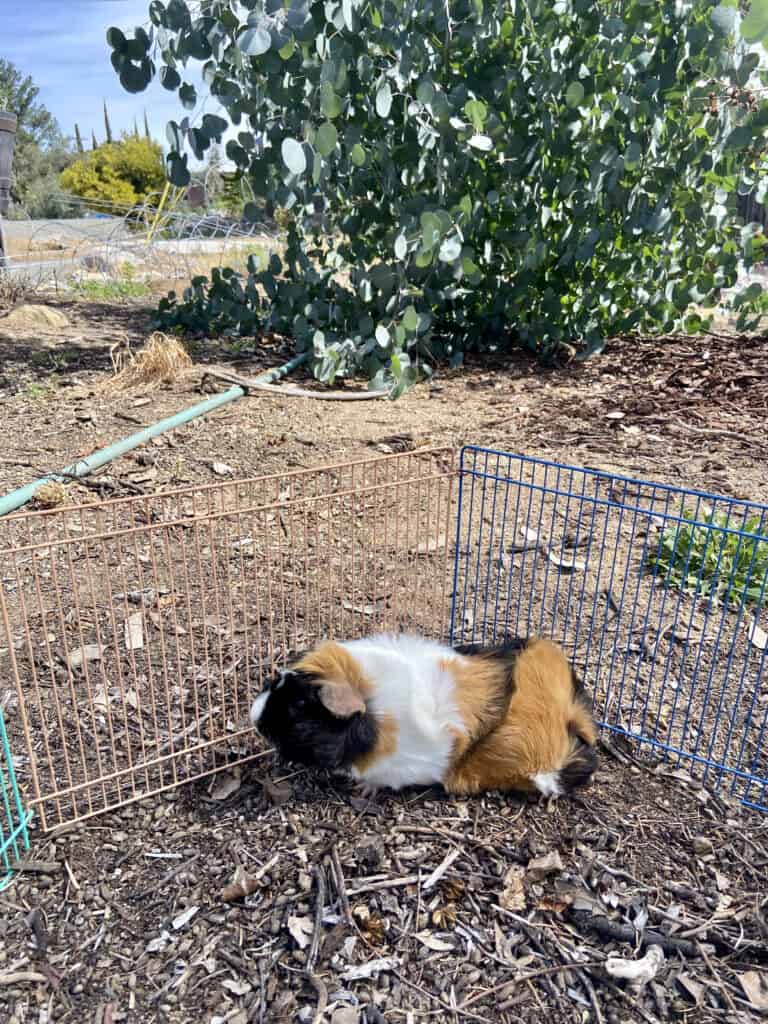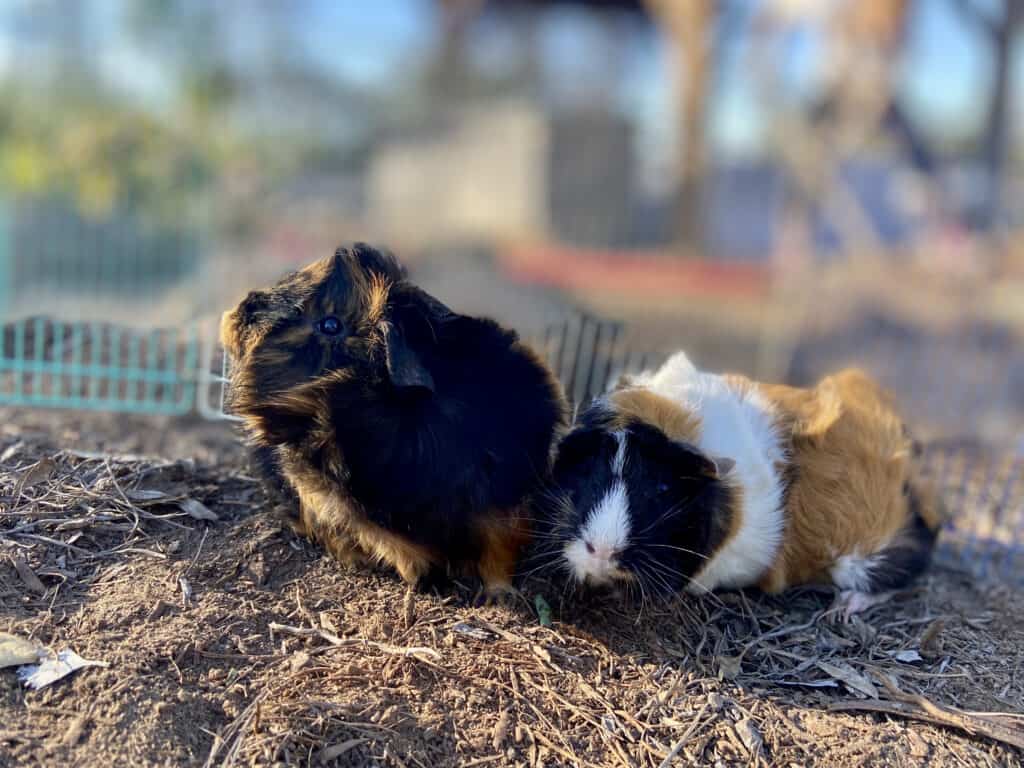As an Amazon Associate we earn from qualifying purchases.
Can guinea pigs eat mushrooms? This is a question that many people have, and the answer can be a little confusing. The fact is that some mushrooms are safe for guinea pigs to eat, while others are not.
In this blog post, we will discuss which mushrooms are safe for guinea pigs to eat and also provide some tips on how to feed them mushrooms safely.
What Are Mushrooms?
Mushrooms are fungi that can be found in many different habitats worldwide. They can grow on trees, in the soil, and even on other animals. Mushrooms come in many different shapes and sizes and can be poisonous or edible.

Nutritional Content of Mushrooms
Mushrooms are a good source of vitamins and minerals, including:
- Vitamin D: helps the body absorb calcium
- Vitamin B: helps the body convert food into energy
- Potassium: helps to regulate blood pressure
- Copper: helps the body form red blood cells
- Selenium: helps to protect the body from damage caused by free radicals
Guinea pigs need a high in fiber with a low sugar diet. Their diet should also include hay, fresh vegetables, fresh fruits, and a small number of pellets. They need these nutrients to stay healthy and avoid getting sick.
Are Mushrooms Safe for Guinea Pigs?
Some mushrooms are safe to eat, while others are not. The best way to determine if a mushroom is safe is to consult with a veterinarian or an experienced pet owner.
Additionally, you can check online resources such as the ASPCA website, which lists toxic plants to animals.
If you decide to feed guinea pig mushrooms, it is essential only to provide them with a low quantity. This is because eating mushrooms can cause gastrointestinal upset in some animals.
Additionally, you should always wash the mushrooms thoroughly to remove any dirt or debris.
Additionally, if you give guinea pigs too many mushrooms, they can become sick or even die. Once again, however, mushrooms aren’t as nutritious as other veggies. Mushrooms are comparable to potatoes in many ways.
They’re delicious but not particularly healthy, so they’ll quickly cause guinea pigs to gain weight if fed freely.
How to Safely Feed Mushrooms?
If you decide to feed guinea pigs mushrooms, there are a few things you need to do to ensure they are safe. First, you should consult with a veterinarian or an experienced pet owner to determine if the mushroom is safe for guinea pigs.
Second, you should wash the mushroom thoroughly to remove dirt or debris. Finally, you should only feed guinea pigs a small number of mushrooms to avoid gastrointestinal upset.
Types of Mushrooms That Are Safe
Many different types of mushrooms are safe to eat. Some of the most popular types of that are safe to eat include:
- Button mushrooms: These mushrooms are small and can be found in most grocery stores.
- Cremini mushrooms: These mushrooms are a type of button mushroom that is slightly darker in color.
- Portobello mushrooms: These mushrooms are large and have a meaty texture.
- Shiitake mushrooms: These mushrooms have a strong flavor and can be found in Asian markets.
These mushrooms can be fed to the guinea pig fresh, cooked, or dried. Dried mushrooms should be soaked in water for about 30 minutes before feeding them to the guinea pig. This will help to rehydrate them and make them more accessible for the guinea pig to digest.

How Many Mushrooms Can Guinea Pigs Eat?
Guinea pigs can eat up to two tablespoons of fresh mushrooms per day. If you are feeding them dried mushrooms, you should only give them a low quantity, as they can expand in their stomach and cause digestive problems.
It is also important to note that you should only feed the guinea pig mushrooms that have been cooked or soaked in water, as raw mushrooms or a wild mushroom can be poisonous to them.
Tips for Feeding Mushrooms
When feeding mushrooms to your guinea pig, there are a few things you should keep in mind:
- Always wash the mushrooms thoroughly before feeding them to your guinea pig. This will help remove any dirt or bacteria that could make them sick.
- Cut the mushrooms into small pieces to make them accessible for your guinea pig to eat.
- Avoid feeding your guinea pig wild mushrooms, as some of these can be poisonous. If you are unsure if a mushroom is safe for your guinea pig to eat, it is best to err on the side of caution and not feed it to them.
- Guinea pigs can eat mushrooms, but it is essential only to feed them a low quantity.
Mushrooms can be a great addition to your guinea pig’s diet, but it is essential to ensure that you are feeding them the correct type of mushroom. Button mushrooms, portobello mushrooms, shiitake mushrooms, and oyster mushrooms are all safe to eat.
Symptoms of Guinea Pig Eating Dangerous Mushrooms
If your guinea pig eats a poisonous mushroom, they may experience any of the following symptoms:
- Diarrhea: This can range from soft stools to full-blown watery diarrhea.
- Vomiting: This can be anything from a bit of regurgitation to full-blown vomiting.
- Lethargy: Your guinea pig may become tired and sluggish if they have eaten a poisonous mushroom.
- Seizures: In some cases, guinea pigs may experience seizures after eating poisonous mushrooms.
If your guinea pig starts to show any of these symptoms, it is essential to consult a specialist immediately.
Conclusion
Mushrooms can be an addition to your guinea pig’s diet, but it is essential to ensure that you are feeding them the correct type of mushroom. Button mushrooms, portobello mushrooms, shiitake mushrooms, and oyster mushrooms are all safe to eat.
If you are unsure if a mushroom is safe for your guinea pig to eat, it is best to err on the side of caution and not feed it to them.
If your guinea pig does eat a poisonous mushroom, they may experience symptoms such as diarrhea, vomiting, lethargy, or seizures. If your guinea pig starts to show any of these symptoms, it is essential to consult a specialist immediately.